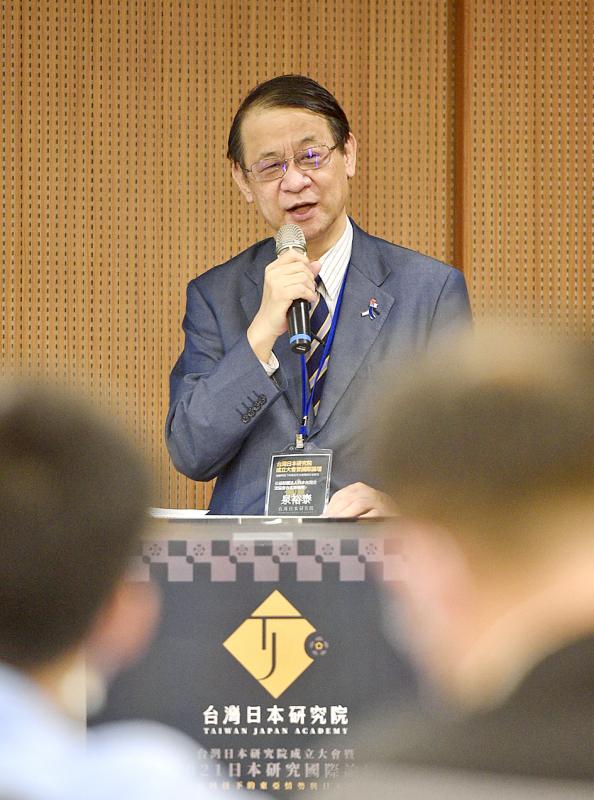Democratic Progressive Party Legislator Kuo Kuo-wen (郭國文) yesterday called on Japan to introduce a “Japanese version of the [US’] Taiwan Travel Act” to facilitate mutual visits by senior officials from both countries.
Kuo, who heads the legislature’s friendship association for East Asia, made the remark at the launch ceremony of the Taiwan Japan Academy at National Chengchi University in Taipei, attended by experts and academics urging stronger Taiwan-Japan ties.
Kuo said that the nation should support Taiwan-friendly Japanese lawmakers who are pushing for a mechanism that would allow official visits.

Photo: George Tsorng, Taipei Times
The friendship between Taiwan and Japan is strong, and the two peoples have come to each other’s aid in the wake of natural disasters, he said.
Former president Lee Teng-hui’s (李登輝) approach to the ties had led to structural changes, he said.
Kuo said he hopes that Japan’s ruling Liberal Democratic Party, which is traditionally Taiwan-friendly, would continue this path. Japanese Prime Minister Yoshihide Suga and members of his Cabinet have repeatedly emphasized the importance of Taiwan’s security, which suggests a shift in Tokyo’s approach to cross-strait affairs, he said.
When then-US president Bill Clinton in 1996 asked Tokyo to revise the US-Japan Treaty of Mutual Cooperation and Security, the discourse in Tokyo revolved around “the situation in the surrounding area,” he said.
That the Suga administration bolstered its geostrategic policy shows that a different school of thought now prevails in Japan’s national security establishment, he said.
Japan-Taiwan Exchange Association Representative Hiroyasu Izumi said Japan hopes that the academy would help bolster rapport and understanding between the two sides, adding that knowledge of Japan would become an asset in Taiwan.
The two countries’ relationship is based on mutual goodwill and sympathy, as demonstrated after the 2011 Tohoku earthquake and tsunami, as well as during the COVID-19 pandemic, he said.
The passing of an old generation of Japanese-speaking Taiwanese — such as Lee, who made great contributions to the bilateral relationship — has made the academy’s work more important than ever, he said.
Taiwan and Japan have technology advantages that could complement each other in ways that could contribute to world peace and prosperity, he added.

AGING: As of last month, people aged 65 or older accounted for 20.06 percent of the total population and the number of couples who got married fell by 18,685 from 2024 Taiwan has surpassed South Korea as the country least willing to have children, with an annual crude birthrate of 4.62 per 1,000 people, Ministry of the Interior data showed yesterday. The nation was previously ranked the second-lowest country in terms of total fertility rate, or the average number of children a woman has in her lifetime. However, South Korea’s fertility rate began to recover from 2023, with total fertility rate rising from 0.72 and estimated to reach 0.82 to 0.85 by last year, and the crude birthrate projected at 6.7 per 1,000 people. Japan’s crude birthrate was projected to fall below six,

Conflict with Taiwan could leave China with “massive economic disruption, catastrophic military losses, significant social unrest, and devastating sanctions,” a US think tank said in a report released on Monday. The German Marshall Fund released a report titled If China Attacks Taiwan: The Consequences for China of “Minor Conflict” and “Major War” Scenarios. The report details the “massive” economic, military, social and international costs to China in the event of a minor conflict or major war with Taiwan, estimating that the Chinese People’s Liberation Army (PLA) could sustain losses of more than half of its active-duty ground forces, including 100,000 troops. Understanding Chinese

US President Donald Trump in an interview with the New York Times published on Thursday said that “it’s up to” Chinese President Xi Jinping (習近平) what China does on Taiwan, but that he would be “very unhappy” with a change in the “status quo.” “He [Xi] considers it to be a part of China, and that’s up to him what he’s going to be doing, but I’ve expressed to him that I would be very unhappy if he did that, and I don’t think he’ll do that. I hope he doesn’t do that,” Trump said. Trump made the comments in the context

SELF-DEFENSE: Tokyo has accelerated its spending goal and its defense minister said the nation needs to discuss whether it should develop nuclear-powered submarines China is ramping up objections to what it sees as Japan’s desire to acquire nuclear weapons, despite Tokyo’s longstanding renunciation of such arms, deepening another fissure in the two neighbors’ increasingly tense ties. In what appears to be a concerted effort, China’s foreign and defense ministries issued statements on Thursday condemning alleged remilitarism efforts by Tokyo. The remarks came as two of the country’s top think tanks jointly issued a 29-page report framing actions by “right-wing forces” in Japan as posing a “serious threat” to world peace. While that report did not define “right-wing forces,” the Chinese Ministry of Foreign Affairs was